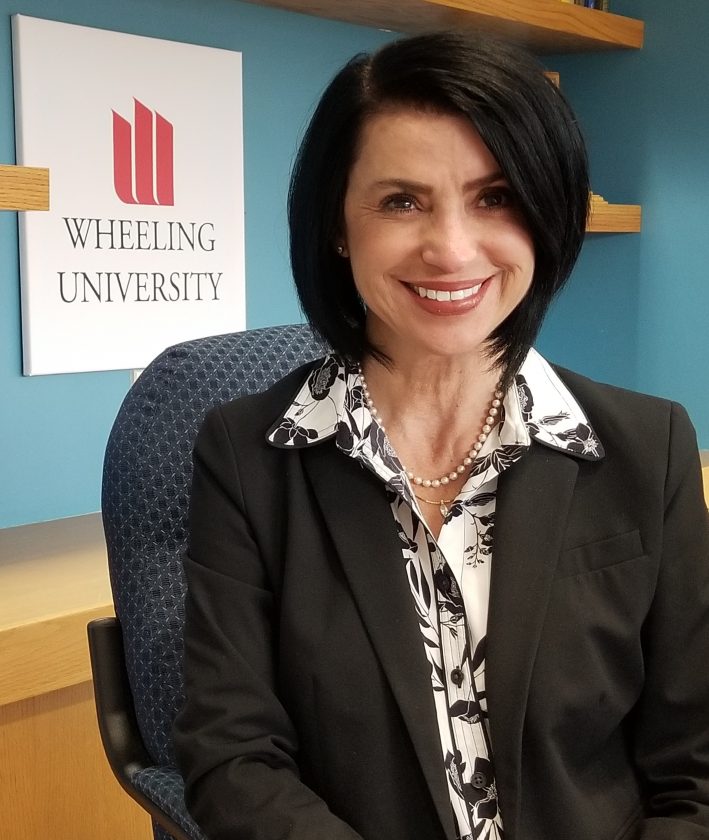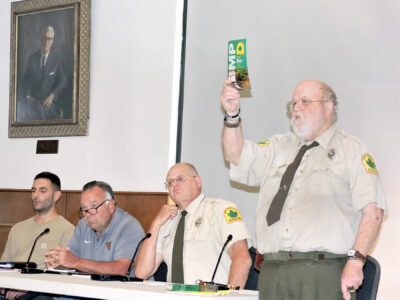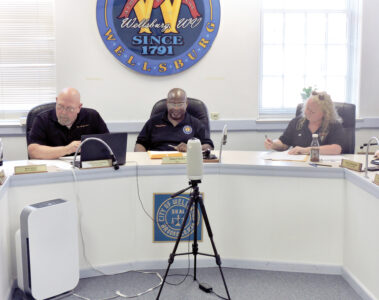Wheeling University President Ginny Favede works to reverse enrollment decline

TRYING TO MAKE A DIFFERENCE — Wheeling University president Ginny Favede is working to reverse a decline in enrollment at the school. (Photo by Mike Jones)
WHEELING — About 600 students left Wheeling University last year as the former Jesuit-affiliated school reeled from financial and administrative problems.
One of those students who transferred out last summer was the son of Ginny Favede, a St. Clairsville resident and the university’s board of trustees chairwoman at the time. She was appointed in early October to become the school’s 13th president.
“Somewhere along the line, we lost focus on what our objective is, and that’s educating our students and giving them a good experience during the four years in which they are here,” Favede said during an interview last week.
In 2019, the university declared financial exigency, lost its Jesuit affiliation, laid off numerous professors, dropped several core programs, fired its president and needed a $2 million donation from the Diocese of Wheeling-Charleston to keep the doors open. Last summer, Favede was unsure if the school would still be open by Christmas break.
“I think that frightened all of us,” Favede said of the university’s precarious financial standing.
But since her elevation to president nearly five months ago, Favede has worked to bring the university back from the financial brink while also re-imagining how the school can best serve its students in the long-term. Favede said last year’s troubles were the result of a litany of issues plaguing the university over the past decade, including its reliance on funding from the Catholic diocese.
The university last month received a $5 million donation — Favede called it an “ask” — from the diocese spread across the next five years that both sides claim will be the last major financial gift from the church. Before receiving the donation, Favede and her staff met with diocesan officials over several weeks to present a five-year plan they hope will put the university on a sustainable financial path.
“What I presented to them is at the end of five years, we would become self-sustaining. And that was important to me,” Favede said. “We had become so dependent that we had become complacent in our everyday duties.
“This university needs to learn to do some of these things, but it’s not going to happen in a year.”
One of Favede’s most urgent duties was building up the enrollment and financial aid offices. The university had no vice president of enrollment for the past two years, making it more difficult to attract prospective students. Current enrollment figures were not immediately available.
The university hired Becky Pauls as its new vice president of enrollment management after she spent time in that same role at Bethany College.
“The most important thing we do is recruit students (and) we had not placed a high-level executive in that particular position,” Favede said.
Favede said she also wanted to boost that department after learning students weren’t getting their financial aid package information soon enough. Amy Whipkey was hired as director of financial aid and Derek Tombs as the assistant director.
“The first school that gets you those (scholarship) numbers, you kind of feel that affinity toward,” Favede said.
School officials also are trying to re-engage with long-time parochial schools in Philadelphia, Baltimore and Cleveland that once had been fertile recruiting spots for Catholic students.
David Hacker, the university’s vice president and chief operating officer, said they struggled over the years to find their footing with diminished resources.
“Priorities were driven by resources rather than the resources being the means to the priority,” Hacker said. “We got into a rut of doing what we could with what we had rather than strategically looking at where we needed to be and using our resources to get there.”
But Favede said they must now rethink how Wheeling University will function moving forward in an era of smaller college enrollment that is affecting many institutions today.
“I don’t know that we will see the university return to what it was,” Favede said. “I think we have re-envisioned what it needs to be in order to be successful in the modern day of colleges.”
A consortium formed last fall between Wheeling University, West Liberty University and Bethany College allows students from each of the three schools to attend another one for certain classes. The university also will host a leadership program for all employees at Wheeling Hospital. And the school soon will be offering an online option for all of its undergraduate courses.
Favede said they need to bring courses and programs to campus that funnel students toward in-demand jobs, such as health care.
“Those that are surviving are surviving because they are innovative and have made adjustments,” Favede said. “We didn’t make any of the adjustments and we certainly weren’t being innovative.”
While they’re no longer affiliated with the Jesuits, Favede is adamant it’s still a Catholic-sponsored university. Although diocesan officials said last month they would no longer make large donations, the diocese still owns and maintains all of the buildings on campus.
Hacker said Aladdin, the school’s new food service provider, plans on making menu and dining hall improvements and spending $600,000 to upgrade the facilities and dining program. He said students will see “stark improvements” in the dining halls and their food options next school year.
“I don’t think that you would find companies looking to do that if they didn’t feel that there was an investment there to recoup that,” Hacker said.
In the summer, the university will hold events and programs – such as leadership camps for youths and high school marching band camps – as a source of revenue
“We have a beautiful campus,” Hacker said. “We just were not putting it forward in a way that benefited the community and also the university.”
Eventually, Favede hopes to reinstate mainstay programs, including theology and philosophy, that were cut last year due to the budget situation. Favede also said she is “100 percent sure” that the incoming freshmen class will graduate with a four-year degree, along with many future students to come.
Long-term success for Favede will be defined by elevated enrollment, consistent annual fundraising campaigns and “surpassing the negativity of what transpired in 2019.”
“If we do our jobs and do it well, we will be fine,” Favede said. “It’s called hard work.”



